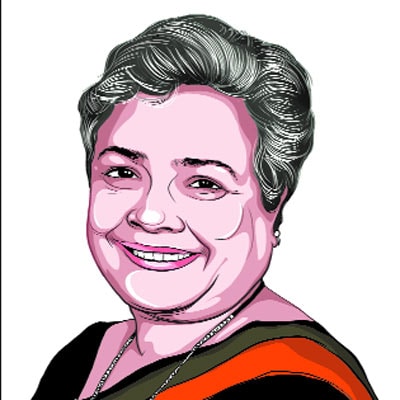Fight the good fight
Some moments in the life of a patriarchy provide points of confrontation — and also openings for change

Such moments in the life of a patriarchy provide points of confrontation, and also openings for change.
Ever since ugly stories about sexual abuse at the workplace began crawling out of the woodwork, from corporate offices, army, even the judiciary, one knew something major was stirring in the belly of the earth. First women abused by bosses, by boyfriends, politicians, their husbands’ superior officers, and by highly-respected members of the judiciary began to reveal brokenly what Susan Faludi calls “a problem with no name”. Within a few decades, they have broken their isolation, begun sharing their experiences on multiple fora and discovered a whole new terminology to articulate their anger in public. The latest result of this is the #MeToo movement that began in the US and went viral.
The testimonies that have surfaced since this hashtag was created are making it clearer by the day that when applied to women, the term sexual is not an adjective defining the personal pleasure of predatory powerful males. It is, simultaneously, also their power-locomotive that carries forward a far broader agenda, subtly defining social, legal and official hierarchies in which women in homes, offices, streets, railway coaches, hotel rooms and flight cabins must submit to the will of the man. Even if they do not wish to give their consent, as one “Baba ji” said (in the case of the young woman at the centre of the December 16 2012 rape case), the woman must address the rapist as her brother and appeal to his sense of mercy!
The finance minister’s outburst against the recent Supreme Court rulings that decriminalised same sex relationships and adultery among consenting adults as also permitted young (possibly menstruating)women into the Sabarimala temple is further proof that any challenge to entrenched male-crafted archaic laws or religious taboos will be interpreted by the power lobby as a challenge to the System itself.
Feminism is perhaps the first theory to emerge from the personal experiences of those whose interests it defines, and whose equality it simultaneously affirms. In 1995, 17 of us senior women journalists decided to plant the seed for what is now a flourishing club for women journalists. In creating the Indian Women’s Press Corps, the idea was to form a collective in the heart of our capital city, for working women journalists, most of whom worked part time or as free lancers then. For, as the poet Adrienne Rich has articulated so well “. those despised and endangered … are not merely the sum of damages done to them”. Reading the testimonies of victimised women three decades later, one realises that the first large batch of female journalists entering the profession in the ‘70s, too, had experienced similar interactions in offices. At that time, like the first wave of all immigrants upon foreign shores, those nasty “happenings” were mostly shrugged off as insignificant or, at best, shared in hushed tones among ourselves. The concept of sexual abuse grievance cells was not even a gleam in the eyes of the System at that point.
This is why the second and third generation of those immigrant females, stronger and supported by many pro-women changes in Indian law and life, are now systematically and clearly laying bare the dark underbelly of Indian workplaces. They are talking about how many times a male colleague or a celebrity interviewee had, by a certain “look” or hug or suddenly or by “accidentally” feeling her body parts, left a female journalist feeling deeply violated, depressed, and degraded. What sort of power does it give a man when he will, with a passing glance, a lingering feel or deliberate brush, send a message of sexual dominance and hierarchies of deference where he is in command? As for women working in smaller towns in the language media, their voices and experiences are yet to surface. But the recent suicide of a senior editor has sent up a swarm of dark tales about the murky lives of young and ambitious women journalists in the language media where most women must confirm their self worth by trying to measure up to the “expectations” of their editors and company owners/managers, which may go well beyond the purely professional.
It is clear by now that gender is not just sex, it is genderised sex that divides power disproportionately between men and women. It is therefore a political system that keeps women subjected to physical insecurity, sexual denigration and deprived of respect, credibility and resources compared to their male counterparts everywhere. Courts do intervene now and then, but only in properly “factualised” cases. Even there, in women’s experience, the law will legitimise itself as reflecting its view of societal norms, but it is society itself that has conferred rationality upon laws. Hence the puzzling dissent note from the lone female judge from the panel that permitted women to enter the Ayyappa temple, on grounds that religion is above rational rules. So lawyers like Arun Jaitley are quick to support her by implying that since law is society in its state form, it must support society’s age-old understanding and application of gender hierarchies and marriage by rising above the rational viewpoint.
Such moments in the life of a patriarchy provide points of confrontation, and also openings for change. Like Arjun in the Mahabharata, Indian women, convinced as a group of the justness of their cause, are determined not to plead guilty or flee (na dainyam na cha palayanam). But still they find themselves gripped with a sudden hesitation. Even if a cause be just, must they raise their weapons against their own?
Interesting, that at this point in one of the earliest recorded game of thrones, Krishna (in Gita) will invoke not Arjun’s patrilinear lineage (or his lily livered father Pandu), but the warrior’s strong-willed mother Kunti. Addressing him not as Pandava but Kaunteya, he says: “Hato va prapsyasi svargam, jitva va bhokshyase mahim,/Tato uttishth Kaunteya, yuddhay krit nishchayah!” In this battle, if you die, you become a heavenly warrior. And if you win, you will enjoy what is true temporal power. So O son of Kunti, be ready to fight a good fight.
Equality, in short, requires total change, a new jurisprudence, a new relation between our lives and law. It will be said that such a change will not be sustainable. But this is premature. As Gandhi, one of India’s biggest dissenters, said, “I have found that it is our first duty to render voluntary obedience to the law, but whilst doing that duty, I have also seen that when law fosters untruth it becomes a duty to disobey it.”
The writer is a senior journalist
For all the latest Opinion News, download Indian Express App
More From Mrinal Pande
- A hug runs through itThe embrace in Parliament ushered spontaneity into stuffy corridors of power ..
- Betraying UttaraUttarakhand teacher’s plea, response to it, reveal government’s attitude to educators...
- Tunes of DissentThe mind of an Indian artist who has always called out the wrong notes of a rigid, stratified classical music ecosystem ..








































No hay comentarios:
Publicar un comentario